 |
 |
 |
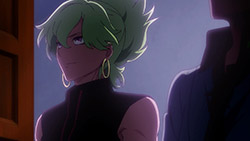 |
 |
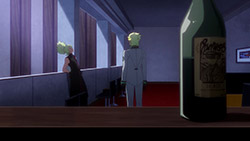 |
 |
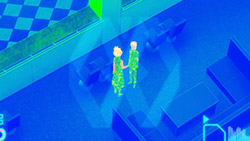 |
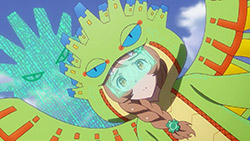 |
 |
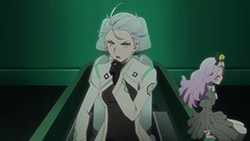 |
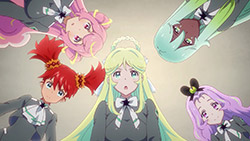 |
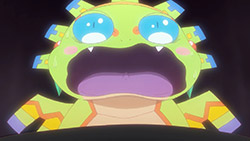 |
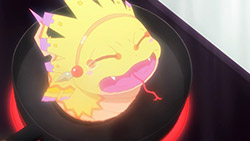 |
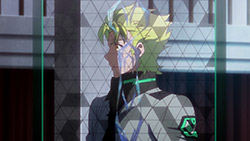 |
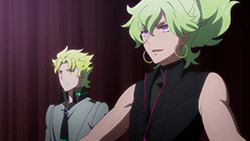 |
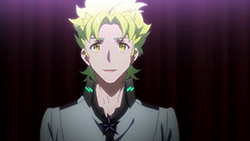 |
 |
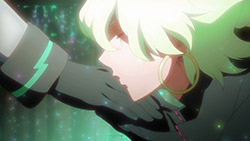 |
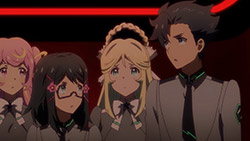 |
 |
 |
 |
 |
 |
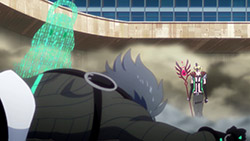 |
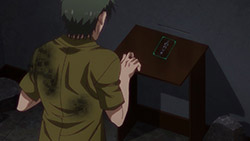 |
 |
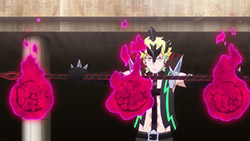 |
 |
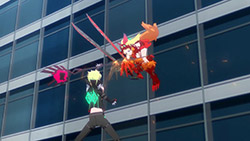 |
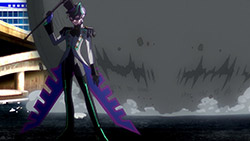 |
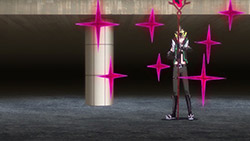 |
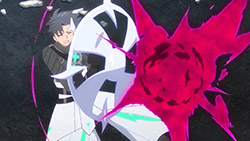 |
 |
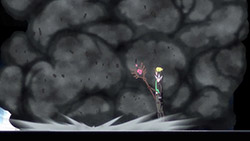 |
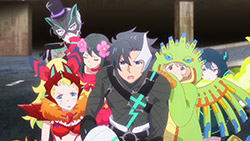 |
 |
 |
 |
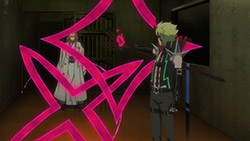 |
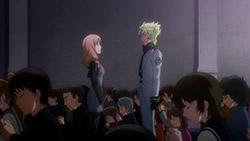 |
 |
 |
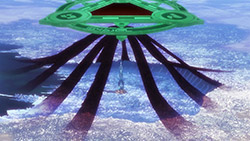 |
「天国か 地獄か/」 (Tengoku ka jigoku ka)
“Heaven or Hell”
What the hell is a logigraph?
Last week, Luck and Logic finally dived into a grander narrative in preparation for the season’s concluding weeks. It set the stage for the betrayal of a former ally and the grand plan for the big bad. Episode ten attempts to raise the stakes even further, but falls short of greatness because of a convoluted mythos and unconvincing character development.
A Porous Reality
Many of this week’s events were galvanized by aspects of the show’s lore. When the Chief & co. try to locate Olga, they track him by his “logigraph.” When Quetzalcoatl explains his former affiliation with Lucifer, he mentions how they got to earth using a “gate card.” The big villainous plan involves putting everyone in “trance jack” by switching out their logic cards. All of these facets of the show’s universe were either never even previously mentioned, or very hastily explained in past episodes. As a result, the flow of events during this week was stagnated by confusion—I was feeling more left in the dark than immersed in what was going on. Luck and Logic has neglected to provide a substantial explanation for much of how this world works, culminating in today’s disorienting episode.
In the past, I’ve praised the show for waiving lengthy descriptions in favor of subtle, implicit exposition—in letting the viewer figure things out instead of batting them over the head with drawn-out monologue. The audience is smart enough to get the gist of some of the basic concepts, such as the bond between logicalists and covenanters, as well as the nature of foreigners. However, it would be nice to get at least something we can chew on. More and more every week the plot has relied on terms or ideas that the writers have just done an absolute poor job of explaining. In previous episodes, this could be easily overlooked because the focus was more on individual characters than anything else. However, this week—where the grander narrative takes center stage—there are way too many instances of this phenomenon, causing for a story which lacks any real dramatic weight.
For example, when the folks back at HQ start to put together the Lucifer’s evil scheme, they explain how individuals undergoing “paradox sickness” are manipulated into desiring “trance jacks”—switching their “logic cards” for m ore ideal ones. Did a lick of that make any sense to those who have been following the show? What exactly is paradox sickness? It’s been briefly addressed before but what kind of physiological symptoms does it cause—can it lead to death? In what ways can one contract it? Furthermore what really are are logic cards? One could surmise from previous episodes that it’s what allows one to be a loglicalist, but does that mean everyone has one? What makes a logic card more ideal than another? How can they just be produced in droves like that? Also, what does it mean to be trance jacked? I thought only logicalists with convenanters could undergo it. What are the different consequences from engaging in such? It’s easy enough to surmise the general premise, but we need to be more fluent with these concepts in order to comprehend the danger of it all.
Examples like this were aplenty—there is just way too much up in the air for the plot to be even minutely coherent. It’s impossible to just go with the flow this time because so much of the episode relies on poorly explained concepts. We all got the general gist of it, sure, but I’m confident that if each of these terms were more thoroughly described, then the severity of the big evil plan would be more apparent—and the moment more dramatic. As it stands, though, the foreignness of the lore prevents me from being engaged or even interested.
A Traitor to his Friends and to the Audience
The episode also suffered from its curious depiction of Olga. Last week’s installment did a brilliant job of capitalizing on all the development he’d been getting in the background for a convincing and dramatic moment. He felt that his peers weren’t considering a legitimate part of the team, but as lesser than them because he lacked a covenanter. This led to a believable change of sides—choosing to form a covenant with the dark devil himself after feeling weak and alienated for so long. He’s not an evil guy, though—he merely got played by Lucifer, who took advantage of his deepening insecurities.
However, this week, Olga was practically unrecognizable. He started the episode with the level of independence and attitude he’s always had. There was even a particularly powerful moment when Olga is cheered and lauded by Lucifer’s followers—finally appreciated and commended, as he’s wanted all along. Quickly, though, he became someone else entirely. From all of his previous development, we’d assume that he’s committing such devastation because he’s compensating for all his inner turmoil. From the things he was spouting at the main cast, though, he seems to have totally bought into Lucifer’s evil scheme, and exhibits no hesitation—even enthusiasm—in violently ripping his teammates apart. The series has done nothing to merit such a jarring shift in character motivation—this development betrays all of Olga’s skillfully administered build-up. There was not issue with him laying waste to the town—and even his former comrades—but he should’ve been saying very different things during the act. He should have been cursing them for viewing them as lesser than them, for always feeling weak, expounding about how vilifying and powerful it feels to be taken in by a god. Instead, he went on and on about restoring balance to the world and to “tetra-heaven,” (again, what? I know what tetra-heaven but how exactly does he intend to do this? What are the specific details of tetra-heaven—why is it supposedly in need to order?) wasting all the potential of his former development.
While one could reply with the notion that he’s being mind-controlled, I would have to heartily disagree. At one point during the big fight, Tsurugi beseeches Olga to realize his mind is under control and snap out of it, only for his new enemy to affirm his independence in the matter. This is would be an appropriate way to develop the utter faith the team had in him—shattering it in a dramatic moment of clarity. Furthermore, during one of the final scenes, Olga shows no signs of being controlled—appearing perfectly autonomous.
Wrapping Up
Overall, an unfortunate misstep into Luck and Logic’s final moments. The previous episode harbored so much potential for an emotionally charge plot going forward—a potential which episode ten spent its time disavowing. The show’s tendency to leave all details of its world unexplained finally imploded during the height of all the action. I don’t know if the show expects its viewers to already be acquainted with the lore (maybe from having played the card game or something), but regardless, the series should have done a better job with familiarizing the viewer with its universe, in order to truly make us care. Further still, all of the great development the show has designated Olga was squandered in a jarring shift of character. Ultimately, the series can still be recovered, for in the scheme of its grander narrative the episode served its purpose well enough—leaving our characters hopeless and defeated, as well as elevating the threat tenfold. I have hope that the final episodes of the season will wrap up the story in a way which makes up for this week’s errors.

Dammit Luck & Logic, when you started out you had the promise of joining the ranks of Shingeki no Bahamut, Wixoss, & even Yugioh for being a card-based show that actually tries to give a concrete story with believable character growth (even in the case of Wixoss and Yugioh being a more obvious advertisement for the cards they still manage to actually pull off a story)….but this doesn’t really even seems like its advertising the cards at this point. L & L fails to even get that much done (because I’m not all that interested in the game with what I’ve seen from the show).
By no means I hate the show, but I will say that it’s dropped to below-average at this point (with the exception of really only 4 good episodes so far).
actually now that I think about it there’s really only 5 good episodes. 1, 2,6,7, & 9
At least for me, the terms have been sufficiently explained. The logigraph is a communicator/HUD/ possibly involved in the trance with their partners. The gate card is what allows them to come over, they got one from the first foreigner defeated in the show. Trance jack is what they call the foreigners taking over someone, and paradox sickness is what happens when someone is trance jacked or is in the foreigner’s paradox area, i.e. The area around them that is affected by their logic. The symptoms are vague but I don’t know if we need to know the exact symptoms. The logigraph and the logic cards could be better explained but some of the other stuff is not hard to surmise from the information provided. Some is quickly explained and I don’t know if some of them need more. Meet the show halfway.
Also tetra heaven is where the goddesses come from
where i see the problem of this show:
The power balance between these Gods, let it be good or evil. They totally mixed to much them
Greek Gods, Christian God (well Lucifer) and Maya God
So.. its like tekken where 1 is to OP
i only can explain it, through they prey and give Lucifer now their “Mana”. where Athena and our Maya god, are long lost Gods of an dead civilization
This episode lift me crying at how bad the character development of Olga went, since i was looking forward for it.
poorly explained stuff even tho i got the gist of it, but why the hell do paople want these new ideal cards and whats wrong with the paradox sickness? I get its bad for logacilists but why normal people need to be worried about it ??
I hope somehow they fix this.
I’m dissapointed that Olga didn’t have a sword. The MC has a shield type weapon, so pairing them both in battle would have been kinda fun to see.